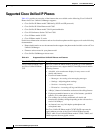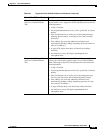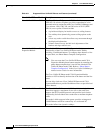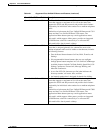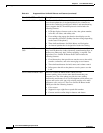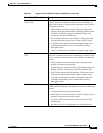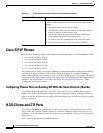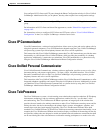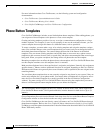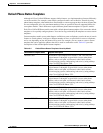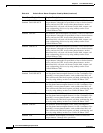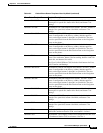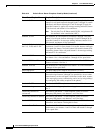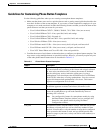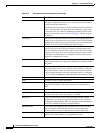
43-9
Cisco Unified CallManager System Guide
OL-14153-01
Chapter 43 Cisco Unified IP Phones
Cisco IP Communicator
You configure H.323 clients and CTI ports through the Phone Configuration window in Cisco Unified
CallManager Administration like you do phones, but they often require fewer configuration settings.
Note Cisco recommends that you do not configure CTI ports or devices that use TAPI applications in a line
group.
For information on H.323 clients and shared line appearances, see the “Shared Line Appearance” section
on page 18-2.
For instructions on how to configure H.323 clients and CTI ports, refer to “Cisco Unified IP Phone
Configuration” in the Cisco Unified CallManager Administration Guide.
Cisco IP Communicator
Cisco IP Communicator, a software-based application, allows users to place and receive phone calls by
using their personal computers. Cisco IP Communicator depends upon the Cisco Unified CallManager
call-processing system to provide telephony features and voice-over-IP capabilities.
This interaction with Cisco Unified CallManager means that Cisco IP Communicator provides the same
functionality as a full-featured Cisco Unified IP Phone, while providing the portability of a desktop
application. Additionally, it means that you administer Cisco IP Communicator as a phone device by
using the Cisco Unified CallManager Administration Phone Configuration window.
Cisco Unified Personal Communicator
Cisco Unified Personal Communicator, a desktop software application, provides access to voice, video,
document-sharing, and presence applications – all from a single, rich media interface. Cisco Unified
Personal Communicator relies on the Cisco Unified CallManager call-processing system to provide
telephony features and voice-over-IP capabilities.
This interaction with Cisco Unified CallManager enables Cisco Unified Personal Communicator to offer
integrated softphone capabilities and control of the physical IP phone of the user. Additionally, it means
you administer Cisco Unified Personal Communicator as a phone device by using the Cisco Unified
CallManager Administration Phone Configuration window.
Cisco TelePresence
The Cisco TelePresence system, a visual meeting room solution that comprises endpoints, IP Telephony
infrastructure technology, and user software applications, enables life-size, “you are there” video
teleconferencing. The Cisco TelePresence IP Phone represents an integral part of the solution that
provides the user interface for making connections to other Cisco TelePresence meeting rooms and for
driving the codec, the device that manages the plasma display screens, microphones, speakers, and
cameras that create the virtual meeting experience. The Cisco TelePresence IP Phone offers both
standard Cisco Unified IP Phone 7970 and Cisco TelePresence meeting connection functionality. As an
example, the Cisco TelePresence IP Phone user interface displays a schedule of the meetings for the day
and provides softkeys that are designed to enable and enhance the teleconference connections but then
can be used during the video teleconference to add audio meeting participants or to make voice calls.




